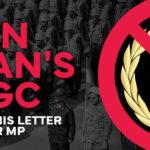In Jeremy Corbyn’s first interview with the Jewish News he proves that he is not part of the solution, he is the problem.
The interview comes after one of the toughest weeks for the Labour leader regarding antisemitism in his party after around 2,000 people, mostly Jews, protested the rampant antisemitism within the Labour party.
The protest happened after Mr Corbyn was found to have protested the removal of an antisemitic mural as well as been a part of yet more pro-Palestinian Facebook groups that espoused antisemitic hatred.
The Jewish News secured an interview with Corbyn, it seems he invited them, after three years of asking for an interview from the Labour leader. The front page of their latest “Jewish News” stated:
“As British Jews said ‘Enough is enough’ on Labour anti-Semitism, we gave Jeremy Corbyn a chance to finally repair the damage. But his answers were simply… NOT GOOD ENOUGH”
These are strong words from the Jewish News and it is good to see the Jewish community stand up against these attitudes.
You can also read the full transcript of the interview, click here.
Corbyn denies that he is antisemitic
Mr Corbyn insisted: ”I’m not an anti-Semite in any way, never have been, never will be.
“Let me say this very bluntly: anti-Semitism is a cancer in our society and it has resurfaced across Europe and in Britain in recent years. It has to be challenged at every single stage.”
However, his downplaying of Labours antisemitic crisis shows he is part of the problem…
Unfortunately, Mr Corbyn failed to take responsibility for the antisemitic crisis his party is in and even tried to disguise the real problem of antisemitism within the Labour party with a misleading statistic.
Corbyn said: “Of the Labour Party cases, some of which I inherited on becoming leader, there’s been 300 references since 2015, 60 are still under investigation, 24 have gone to the National Constitutional Committee, 24, roughly, went to a final warning, and 150 were either expelled or resigned. That represents 0.02 percent of the party membership. There are other cases pending.”
What the Labour leader has done here is to calculate the number expulsions and resignations with every member of Labour, of which there are over 552,000, to get the 0.02% figure.
It is important to point out that most of Labour’s members who have been “expelled or resigned” have been more than just simply members of the party. After all, a regular member who has no position in the party cannot “resign”. The majority of these expulsions have been for positions within the party such as councillors and community leaders, for example. The reason they have been flagged up for expulsion in the first place is because they have run for a position, placing themselves in the public spotlight, and then had their social media feeds checked and been found to have made antisemitic comments.
What is shocking about Corbyn’s use of this statistic is a number of senior Labour members, including prominent politicians, have witnessed antisemitism online and done nothing about it.
Corbyn himself was part of multiple Labour groups where antisemitism was regularly espoused. Corbyn never reported any of those Labour members. He never took challenged those antisemitic views and he never referred any of those members for exuplsion.
While some of the people who made antisemitic comments on the Facebook pages were banned from those Facebook pages, very rarely were they referred to the disciplinary board or expelled from the party.
In fact it took an investigation by Jewish journalist, David Collier, to expose the hatred and prompt action from the Labour leadership, this is despite the fact that Labour leaders were part of those Facebook groups.
Since that expose, even more Facebook pages have been uncovered that either are linked with the Labour party or Labour politicians, including Corbyn, are part of. The people who run those pages, and followers of those pages are still members of Labour and very few of them have been referred.
Therefore, for Mr Corbyn to compare the number of expulsions and resignations to the full number of Labour members and come up with the 0.02% is a disgrace!
Fortunately, not all Labour MPs are like this and some of them are stepping up their efforts to ensure that all the antisemites (and racists of all kinds) in the party are flagged up and referred to the discrimination panel. Labour MP John Mann referred 130 new people in a single day this week after they espoused antisemitic, racist or misogynistic attitudes online.
There is also the question of thousands of Corbyn supporters, presumably some of whom are Labour members, who this week have added their names to a letter that claimed the Jewish protest against antisemitism outside Parliament this week was organised by a “very powerful special interest group” and said other things that by most accounts, would be deemed antisemitic.
Corbyn’s attempts to downplay the seriousness of this crisis show that he is not part of the solution, he is the problem.
Corbyn defends his position on inviting Palestinian leader, and vehement anti-Semite, Raed Salah to Parliament.
JN: One example is Raed Salah who had been accused of a blood libel among many other things, yet you called him “an honoured citizen”?
JC: I met Raed Salah after he’d appealed the case. He came to Britain as an Israeli citizen and was given normal access and normal entry. There was later a ban order placed on him by the Home Office which was challenged in court. He was then released essentially on house bail. He then challenged in court the whole process and actually he won the case on his right to be visiting Britain. I met him because he was a very significant figure in the Israeli-Palestinian community.
I questioned him on the whole blood libel issue which he emphatically denied and the conversation I had with him were along the lines of ‘what kind of future peace can there be,’ ‘what kind of relationship can there be between Israel and the Palestinians’. Does it mean I agree with everything he’s ever said? Obviously not. He was later convicted in Israel on that case but it was not a pending case at that time. But I did make my position extremely clear to him and I felt it was right to have that discussion. You have to have discussions with people you disagree with within the Israeli-Palestinian community.
JN: You’ve said he didn’t say anything anti-Semitic to you but it didn’t change the fact he faced accusations and you said you’d be happy to welcome him for tea in Parliament…
JC: That was when he was here and then the order was placed by the Home Office after he’d arrived, which was a little unusual, because he was already here. I met him, I set out my views, I asked him for his views and we had a discussion about future prospects for peace and a two-state solution to the Middle East crisis
JN: Can you understand why calling him ‘an honoured citizen’ would be extremely offensive?
JC: It was inclusive, polite language I used which I now recognise of course can be easily misinterpreted.
JN: You regret the words you used at the time?
JC: They were inappropriate.
Raed Salah espoused antisemitic blood libels against the Jewish people for which he is currently imprisoned for. He has incited his followers to violent protests against Israeli Jews in 2007, years before he came to the United Kingdom. Salah preaches that an Israeli civilian is just as valid a target as an Israeli soldier.
The following video shows that what Corbyn said about the man in 2012 was far more than just “inappropriate”:
Corbyn fails to see the antisemitic attitudes that run rampant in Palestinian activists
JN: It looks as if you cared more about Palestinian rights than you did about allegations that were put repeatedly from the mainstream Jewish community about anti-Semitism and those associated with it?
JC: Not at all. Anti-Semitism is a poison and evil and wrong that brought about genocide of the Holocaust against the Jewish people. It’s what our parents’ generation fought to defeat. I think there has to be a process to bring about peace in the Middle East and that has to involve justice for the Palestinian people and, as I’ve consistently repeated, an end to the occupation and the settlement policy so that Palestinians can also grow up in peace and their own security. The best security is peace.
JN: Almost every case of suspensions and expulsions from Labour we’ve seen people who considered themselves activists for Palestine but who crossed the line into anti-Semitism. Is there a problem within the pro-Palestinian movement in general?
JC: I don’t think it’s a general problem. I think there are anti-Semitic people who latch onto all kinds of causes but in my experience in the Palestine Solidarity Campaign they were absolutely assiduous and specific. They’re not accepting Holocaust denial and they’re not allowing anti-Semitic behaviour to take place.
Later on he is asked again about the link between Palestinian supporters and antisemitism.
JN: It’s a fact however that most of the people who have been suspended are activists for Palestine who have crossed the line into anti-Semitism…
JC: There is a problem of anti-Semitism within our society. Is there a general problem with everybody who supports the Palestinians’ rights to exist in peace? No. Are there some people that latch themselves onto that who do hold anti-Semitic views? Obviously there has been and obviously they have to be challenged. And that is what we have been doing.
JN: Why didn’t you challenge them through your 30-year career, to the extent that you challenge them now?
JC: I just told you I did. On Palestine Solidarity conferences we’ve voted to remove people who behaved in an anti-Semitic way or been practicing Holocaust denial. And that is very clear. You can ask those within the Palestine Solidarity, they are very, very clear about that.
Corbyn is not a Zionist
JN: Your shadow foreign secretary was happy to describe you as a Zionist – is that a term you would accept for yourself?
JC: I wasn’t quite sure in what context she meant that or said that. What I want to do is ensure there is a process that brings about peace in the Middle East. A Labour government would be fully engaged in bringing that about – that involves recognition of the state of Palestine, an end to the settlement policy and occupation and a two-state future.
However, he would visit Israel and meet with Netanyahu.
JN: Do you plan to visit Israel?
JC: At some point, yes, I will be in the Middle East.
JN: Would you be happy to meet Netanyahu?
JC: Well I will be visiting the state of Israel so yes, of course.
To read the full transcript of Jeremy Corbyn’s interview with Jewish News, click here.
To listen to the full interview, click below.










